
Yakov Petrovich Kulnev was, along with Pyotr Bagration and Aleksey Yermolov, one of the most popular Russian military leaders at the time of the Napoleonic Wars. Suvorov's admirer and participant of 55 battles, he lost his life during Napoleon's invasion of Russia.

Count Alexander Petrovich Tormasov was a Russian cavalry general prominent during the Napoleonic Wars.

Peter Tekeli (1720–1792) was a Russian general-in-chief of Serb origin. He achieved the highest rank among the Serbs who served in the Imperial Russian Army. He was born in a noble family of military tradition, whose men were officers of the Austrian army in the Military Frontier. Prior to his emigration to Russia in 1748, he fought as a young officer in the War of the Austrian Succession. Characterized by both courage and military cunning, he made a splendid career in Russia. He participated in the Seven Years' War, the first Russo-Turkish War (1768–1774), and the second Russo-Turkish War (1787–1792). Under his command, Zaporozhian Cossacks were disbanded and subjugated to the Imperial authority in 1775, without spilling a single drop of blood, for which he received the Order of St. Alexander Nevsky from Empress Catherine the Great. He retired in 1790, and died two years later in his mansion at Novomirgorod.

There is a community of Serbs in Russia, also known as Russian Serbs, which includes Russian citizens of ethnic Serb descent or Serbian-born people residing in the country.
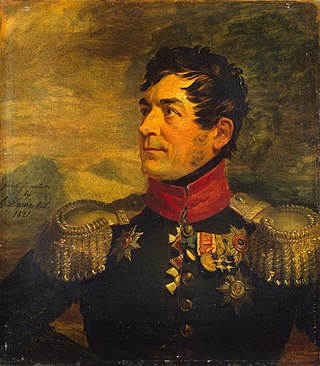
Count Georgi Arsenyevich Emmanuel was a Russian general of Serbian origin who participated in the Napoleonic Wars.
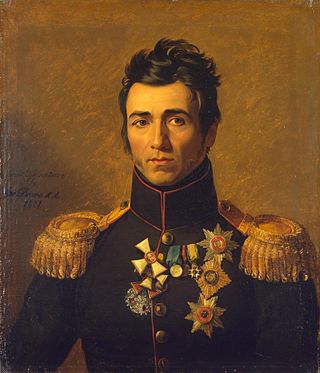
Peter Mikhailovich Kaptzevich or Kapcević or Kapzewitch was a General who led a Russian infantry corps during the 1814 Campaign in France. In 1812 he led the 7th Division at Smolensk, Borodino, Maloyaroslavets and Krasnoi. Promoted to command the 10th Infantry Corps, he fought at the Katzbach and Leipzig in 1813 and Vauchamps, Gué-à-Tresmes, Laon and Paris in 1814. He was governor of Western Siberia in 1822–1827 and the following year he led a corps of Siberian militia. He is buried at the church in Nikolskoye, Sakmarsky District, Orenburg Oblast.
Simeon Piščević was a Serbian memoirist and imperial Russian general.
Ivan Lukačević, known as Podgoričanin (Подгоричанин), was a Russian Imperial captain of Serb origin from Podgorica that participated in planning of a Balkan Orthodox uprising with Russian aid against the Ottoman Empire. He was sent with Russian colonel of Serb origin, Mikhail Miloradovich, to deliver documents issued by emperor Peter the Great on 3 March 1711 that called the Balkan Orthodox to rise up against the Ottomans during the Pruth River Campaign. Miloradović and Lukačević arrived at Cetinje and delivered them to metropolitan Danilo, who had them read at a Montenegrin church assembly. This was the first Russian delegation to Montenegro. Danilo, Miloradović and Lukačević then organized military operations. In September 1712, Lukačević left Montenegro and headed for Russia. However, he was left in Berlin.

Mikhail Fyodorovich Mirkovich was an Imperial Russian regimental commander and ethnographer. He participated in the wars in Poland and against the Ottoman Empire. He is the son of Fedor Yakovlevich Mirkovich.
Jovan Samuilović Horvat de Kurtič, also referred to as Ivan Horvat, was a Russian general of Serbian origin who founded New Serbia in the modern Kirovohrad Oblast.
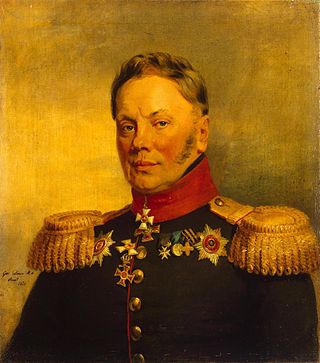
Baron Ilya Mikhailovich Duka was a Russian general in the Napoleonic Wars.
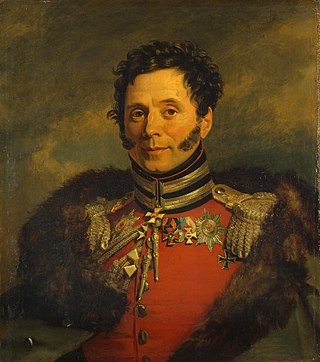
Nikolai Ivanovich Depreradovich was one of the most decorated Russian generals who fought against Napoleonic France. He was a general of the cavalry and adjutant general who took part both in Napoleonic Wars and Finnish Wars. His family, with roots in Serbian lands, moved to Imperial Russia in 1752.
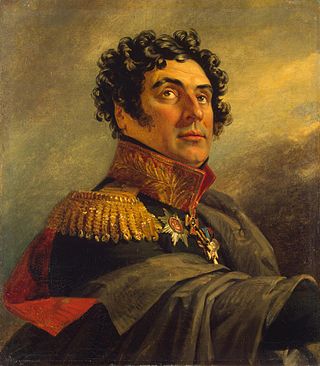
Count Peter Ivanovich Ivelich or Peter Ivelich IV was a Serb Montenegrin who ranks among the most important Russian generals who fought during the Napoleonic invasion of Russia. His portrait was added to the Military Gallery of the Winter Palace along with other participants in the Patriotic War of 1812. His uncles are count Marko Ivelich, major-general Ivan Konstantinovich Ivelich and colonel Simeon Konstantinovich Ivelich.

Count Marko Konstantinovich Ivelić (1740–1825) was a Serbian born Russian general from Risan who rose to prominence in Russian military service during the reign of Emperor Nicholas I of Russia and Prince-Bishop Petar I Petrović-Njegoš of Montenegro. He became a Russian general and count. In 1811 he was a diplomatic emissary to Revolutionary Serbia.

Ivan Egorovich (Georgievich) Shevich was a Russian-born Serb nobleman who was one of the leading fighting-generals, and one of the bravest, in the Russian Imperial army under the command of Mikhail Kutuzov and Emperor Alexander I in the war against Napoleonic France. His grandfather, Lieutenant-General Jovan Šević, led Serb colonists from the Habsburg Monarchy to Imperial Russia during the reign of Empress Elizabeth Petrovna. Ivan's victory against Napoleon at the Battle of Borodino in 1813 puts him in the first rank of Russian military heroes. Today his portrait hangs with other generals in the Military Gallery of the 1812 State Hermitage at St. Petersburg.
Ivan Stepanovich Adamovich was a highly-decorated Russian general who fought at the Battle of Borodino, commanding the 1st Corps of the Reserve Army.
Nikolay Ivanovich Bogdanov was a Russian General who participated in the wars against Napoleonic France. He received numerous awards and decorations for his work and with his experience also later fought the Ottoman Turks. In the Napoleonic Wars, he took part in the hard-fought Battle of Borodino.

Andrei Stepanovich Miloradovich was a Russian military leader, statesman and lieutenant general. He is the father of general Mikhail Miloradovich.
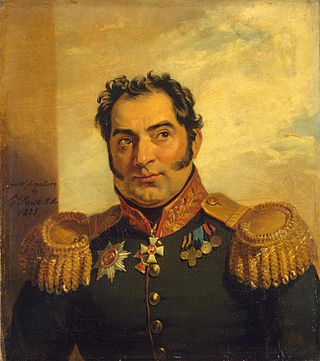
Nikolay Vasilyevich Vuich was an Imperial Russian general who fought in the Russo-Swedish War, Russo Turkish War, the Polish campaign and the Napoleonic Wars. He distinguished himself in all the wars in defense of Imperial Russia and contributed his mite in the success of the Coalition forces against Napoleon. His portrait now hangs at the 1812 Military Gallery of the Winter Palace.

Nikolay Dmitrievich Tatischev was an infantry general, hero of the Russo-Turkish War (1877-78).














